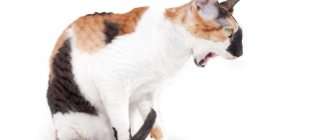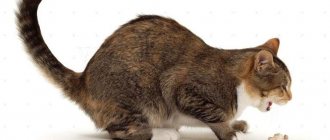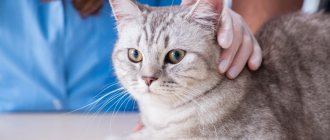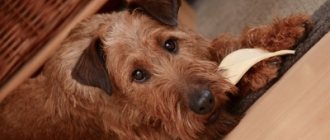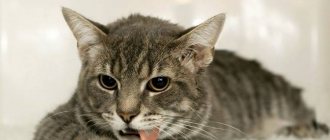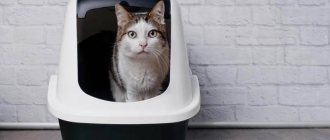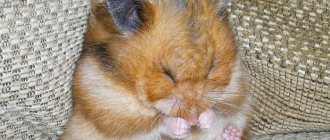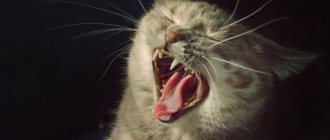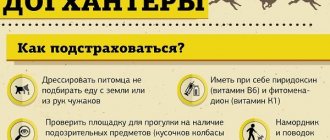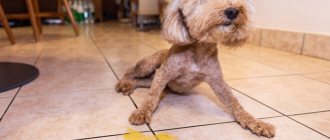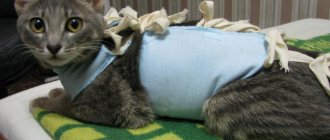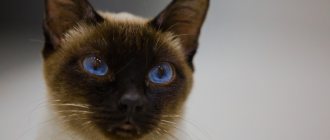The situation when an animal vomits is unpleasant for both the pet and the owner. Vomiting in a cat occurs for various reasons: from inappropriate food to disruption of internal organs. An attack does not always require veterinary care; in some cases, the owner successfully copes with the problem at home.
But you need to pay attention to every situation when a cat is vomiting. Objects that enter the stomach and cause vomiting can cause internal injury. Nausea can be a symptom of various animal diseases.
What causes vomiting
In the case of a one-time incident, we can talk about non-dangerous physiological causes of nausea. If vomiting occurs repeatedly, you need to consult a veterinarian.
Non-hazardous reasons
Most often, vomiting in animals occurs after overeating and when the cat absorbs its food too quickly. For example, if several animals live and feed together, they begin to compete for food and try to eat as much as possible, swallowing food in pieces. But the digestive tract cannot accommodate such a volume and pushes food back.
Vomiting can also occur when consuming low-quality feed with low protein content. Cheap products contain only three percent meat. If the amount of complete protein is insufficient, the number of enzymes produced decreases, food is not digested, and the cat cleanses the digestive tract by vomiting. By-products and additives included in cheap feeds also provoke vomiting.
If after a single vomiting the pet’s condition is normal, he does not have a fever, he is cheerful, happy, with a wet nose and shiny eyes, he eats and plays again, then everything is fine - there is no need to worry. The animal is healthy and most likely the problem was overeating.
Causes requiring treatment
Poisoning is a fairly common cause of vomiting in cats. A cat can become poisoned by poor-quality food or inedible substances. In this case, the animal’s body cleanses itself of the remnants of poor-quality food and toxins through vomiting. In addition, loose stools are observed, which promotes rapid cleansing of the intestines.
Diseases that cause vomiting in a cat after eating and not only include:
- bacterial and viral infections are the most dangerous group, as they often lead to death;
- inflammatory processes in the stomach, pancreas, intestines, tumors and ulcers;
- presence of parasites.
If vomiting recurs and the cat’s well-being worsens, if blood and mucus can be seen in the vomit, then it is necessary to show the animal to a veterinarian. The doctor will find the reasons why your cat vomits after eating and prescribe the optimal treatment.
Reason #3: enzyme deficiency
Sometimes the pancreas does not produce enough digestive enzymes such as lipase, protease and amylase, which can lead to acute or chronic pancreatitis. Pancreatitis (inflammation of the pancreas) is very common in cats and, even in the absence of other obvious symptoms, can be the main cause of periodic vomiting.
In the process of evolution, cats have learned to eat raw foods, primarily mice, rich in digestive enzymes. This is what is lacking in ultra-processed commercial cat foods.
What to do? In any case, I recommend adding digestive enzymes to the diet of cats with problems with vomiting. If your cat's pancreas produces enough enzymes, adding more enzymes to the food will not cause any problems. However, if her pancreas does not secrete enough enzymes, taking supplements will ensure that she has everything her body needs to digest food. Providing high quality digestive enzymes can help reduce vomiting as well as reduce the risk of pancreatitis.
When you click on the buttons, you will be taken to the iHerb store and using our affiliate link you will receive a 5% discount! BUY ENZYMES
What can vomiting look like after eating?
Vomiting after eating is not always a disease; it can be a sign of a one-time cleansing for physiological reasons. By its appearance and consistency, you can determine the reason that caused the stomach to reject food. If a cat vomits after eating undigested food, it is necessary to examine the vomit and, if any signs are suspicious, contact a veterinarian.
Undigested food
If a cat vomits after eating undigested food, this means that the pet was overfed or he ate too quickly. The stomach is unable to process large pieces that are swallowed greedily, which is where problems arise.
Owners should take into account that a single case of vomiting does not pose a threat to the health of the animal, however, if it occurs repeatedly, it is necessary to make an appointment with a doctor. One of the reasons for constant vomiting of undigested food may be a malfunction of the pancreas or problems with the stomach itself.
With hairballs
Cat breeds with long, thick hair may well suffer from hairball vomiting (trichobezoars). While licking, the pet swallows fur, it accumulates in the stomach and causes discomfort. Large hairballs irritate the mucous membranes of the stomach walls, the so-called tickling. Trichobezoars interfere with normal digestion of food and, as a result, cause vomiting.
If wool is constantly swallowed by an animal, it clogs the stomach or intestines itself - this requires urgent treatment, as it can be fatal. Special pastes or herbs will help prevent trouble - when eating it, the cat feels nauseous. Vomiting removes the fur from the body, and it continues to function normally.
With bile or foam
Sometimes a cat vomits after eating with bile or foam. It is necessary to distinguish between these two options.
If you vomit with bile, you may suspect problems with the gallbladder or liver function. In exceptional cases, vomit may have traces of white foam. There is no need to waste time, but urgently take the cat to the hospital - he is in pain, unwell, and without treatment he may die.
Vomiting with white foam most often symbolizes that the cat is hungry. If an animal has not eaten for a long time and then swallows a large amount of food, there is a high probability of nausea from undigested food covered in white foam.
In case of regular repetitions of foamy or yellow vomiting, it is necessary to take the cat to the doctor and have it examined.
First aid for a pet
Before visiting a doctor, you can relieve your pet’s condition on your own. For this, the following treatment methods can be used :
- Limit the cat's feeding for a day, allow water (very little) if it does not cause new attacks.
- If your pet might have eaten something stale, you should induce vomiting: you can press your finger on the root of the tongue (the cat must lie on its side or stand, otherwise it may choke on the vomit) or drink it with a mixture of a glass of lukewarm water and a tablespoon of salt before the urge comes.
- If the cat has swallowed something spicy, you need to give it 1 tsp. Vaseline oil to protect the walls of the esophagus.
- If the cat has ingested chemicals, for example, alkali, turpentine, etc., then you need to give it 1 tbsp. l. "Enterosgel".
After alleviating the animal’s condition, it is necessary to consult a doctor as soon as possible, providing the necessary treatment for the cat.
Diagnosis of pathologies
The help of a specialist is absolutely necessary if your pet experiences nausea for more than a day or every day.
The veterinarian will diagnose the health condition and also monitor the condition. First of all, he will perform palpation - feeling the abdominal cavity. This will reveal compactions, congestion or tumors. At the same time, the doctor will ask the owner about the cat’s behavior in recent days, about its diet and pastimes.
If a disease is suspected, urine and blood tests will be ordered; in more complex cases, an ultrasound or x-ray will be required. After the results are ready, the veterinarian will tell you what to do if your cat vomits after eating, how and how to treat it. In rare cases (intestinal blockage, tumor), surgery may be required.
Self-diagnosis is only possible if the cat has vomited once and is feeling well. In all other cases, you need to take your pet to the hospital or call a doctor at home.
Reason #7: Toxins
Poisoning can also cause acute vomiting. If your cat is generally healthy and suddenly starts vomiting, this may indicate poisoning. Even if your cat is only indoors, she may still find poison. For example, many types of houseplants are poisonous to cats, but cats still love to eat them.
What to do? Instead of these plants, offer cat grass instead. Additionally, any pesticides, herbicides, or cleaning products should be kept out of your pet's reach. If you're still using traditional toxic cleaning products, one of the best gifts you can give your entire family is to switch to non-toxic household cleaning products.
Article continues after advertisement
Therapeutic measures
A veterinarian's help is needed if vomiting continues for more than a day; the cat vomits several times a day after each feeding or even without food. If in the vomit, in addition to food, impurities of blood or bile are found, there is no appetite and the animal refuses to drink water, the help of a specialist is needed immediately.
After the examination, the veterinarian will suggest additional examination, if necessary, make a diagnosis and prescribe treatment.
Drug therapy
Treatment for vomiting is selected depending on the reasons that caused this condition. In case of poisoning, enterosorbents are used to prevent the absorption of toxins into the bloodstream, and a gentle diet with plenty of fluids is prescribed.
If the animal is infected with parasites, antihelminthic drugs are used. They are given based on body weight twice with an interval of 7-14 days (details are indicated in the instructions for each specific drug).
For diseases of the gastrointestinal tract, antibacterial, enzyme, and anti-inflammatory drugs are used, and droppers are prescribed. Treatment is carried out under the supervision of a veterinarian. Self-administration of medications can harm the cat, worsen its condition and lead to death.
If vomiting is a secondary symptom of a viral infection, then the root cause is eliminated. For this purpose, the cat is prescribed a number of drugs: antiviral and antibacterial, immunomodulatory, nutritional, probiotic and others.
It is necessary to follow all the veterinarian's instructions and complete the course according to his recommendations, and not when the animal feels better. An untreated illness can return with a vengeance.
Diet
If there is repeated vomiting, you need to remove food: the cat should be on a starvation diet until the nausea and diarrhea stop. Then, for two days, you should give the cat light food in small portions 5-7 times a day.
Suitable products would be:
- puree from boiled rabbit or poultry meat;
- rice water or boiled rice;
- vegetable puree from boiled carrots, pumpkin, broccoli in a light meat broth;
- actually, the meat broth itself.
If everything is fine after two days, the cat can be gradually transferred to a regular diet.
What not to do if your cat vomits after eating
Vomiting in a cat after eating can occur at any time - you need to be prepared for anything. Even if it’s just regurgitation of fur, you should never do the following:
- force an animal to eat and drink;
- independently prescribe medications;
- self-medicate the animal;
- attempt a gastric lavage or enema without consulting a veterinarian;
- scold the animal for damaging the carpet or furniture.
Performing such actions will negatively affect the health of the animal. Newly introduced food or water into the body will cause new attacks of nausea, and the use of medications should only be carried out in accordance with the doctor’s treatment regimen. The only thing that can be done if a cat vomits after eating is to observe him, examine the vomit and provide rest. The latter will not be superfluous if you suspect any disease.
Diet for cats with enteritis
Starvation diet. Prescribed in the first 1-2 days after the start of treatment. Involves complete abstinence from any food. The main thing is to provide your cat with free access to clean drinking water. We recommend using boiled water at room temperature.
A gentle diet. The first meal is boiled oatmeal. It gently envelops the intestinal walls due to its slimy texture, therefore improves its peristalsis and restores damaged mucous membranes.
If the cat has already begun to recover, start adding some minced meat to the diet. Choose lean meats (chicken, turkey). Then gradually introduce other foods into your diet, avoiding unwanted ones. Prohibited foods for cats are:
- pork,
- bones,
- sausages,
- canned fish and meat,
- liver,
- raw meat and fish,
- salty, fatty and smoked foods.
Remember that in case of enteritis you need to act quickly. The earlier you detect the disease, the better the prognosis for your pet!
Veterinary clinics in Moscow
We work in all districts (districts) of Moscow and Moscow Region
- Airport
- Avtozavodskaya
- Alma-Ata
- Arbatskaya
- Alexander Garden
- Academic
- Alekseevskaya
- Aviamotornaya
- Annino
- Altufyevo
- Lenin's Library
- Belarusian
- Baumanskaya
- Bagrationovskaya
- Belyaevo
- Botanical Garden
- Babushkinskaya
- Barricade
- Treadmill
- Dmitry Donskoy Boulevard
- Borovitskaya
- Bibirevo
- Borisovo
- Bratislavskaya
- Admiral Ushakov Boulevard
- Buninskaya Alley
- Bitsevsky Park
- Sparrow Hills
- Water stadium
- Voikovskaya
- Volokolamsk
- Exhibition
- VDNH
- Vykhino
- Volgograd Prospect
- Vladykino
- Volzhskaya
- Varshavskaya
- Dynamo
- Domodedovo
- Dobryninskaya
- Business center
- Dmitrovskaya
- Dubrovka
- Dostoevskaya
- Zhulebino
- Zyablikovo
- Izmailovskaya
- Krasnoselskaya
- Komsomolskaya
- Red Gate
- Kropotkinskaya
- Kolomenskaya
- Kashirskaya
- Kantemirovskaya
- Krasnogvardeyskaya
- Krylatskoe
- Kuntsevskaya
- Kyiv
- Kursk
- Kutuzovskaya
- Krasnopresnenskaya
- Konkovo
- Kaluzhskaya
- China town
- Kuzminki
- Kuznetsky Bridge
- Kozhukhovskaya
- Peasant outpost
- Kakhovskaya
- Lubyanka
- Leninsky Prospekt
- Lermontovsky Prospekt
- Lyublino
- Lesoparkovaya
- Mayakovskaya
- Mitino
- Myakinino
- Youth
- International
- Medvedkovo
- Marxist
- Mendeleevskaya
- Maryino
- Marina Grove
- Novokuznetskaya
- Novoslobodskaya
- Novoyasenevskaya
- New Cheryomushki
- Novokosino
- Novogireevo
- Nakhimovsky Prospekt
- Nagornaya
- Nagatinskaya
- Okhotny Ryad
- Orekhovo
- Oktyabrskaya
- October Field
- Otradnoe
- Preobrazhenskaya Square
- Park of Culture
- Vernadsky avenue
- Paveletskaya
- Pyatnitskoe highway
- Victory Park
- Revolution square
- Partisan
- Pervomayskaya
- Pionerskaya
- Peace Avenue
- Trade Union
- Proletarskaya
- Pushkinskaya
- Polezhaevskaya
- Glider
- Perovo
- Ilyich Square
- Prague
- Polyanka
- Petrovsko-Razumovskaya
- Printers
- River Station
- Rizhskaya
- Ryazan Avenue
- Roman
- Sokolniki
- Sports
- Falcon
- Strogino
- Slavyansky Boulevard
- Smolenskaya
- Semenovskaya
- Student
- Sukharevskaya
- Sviblovo
- Skhodnenskaya
- Sevastopol
- Serpukhovskaya
- Savelovskaya
- Sretensky Boulevard
- Tverskaya
- Teatralnaya
- Taganskaya
- Teply Stan
- Tretyakovskaya
- Turgenevskaya
- Textile workers
- Tushinskaya
- Tula
- Timiryazevskaya
- Pipe
- Podbelsky Street
- University
- Street 1905
- Academician Yangel Street
- Starokachalovskaya street
- Skobelevskaya Street
- Gorchakov Street
- Frunzenskaya
- Filevsky Park
- Fili
- Tsaritsyno
- Tsvetnoy Boulevard
- Cherkizovskaya
- Chistye Prudy
- Chertanovskaya
- Chekhovskaya
- Chkalovskaya
- Shabolovskaya
- Highway Enthusiasts
- Shipilovskaya
- Shchelkovskaya
- Shchukinskaya
- Elektrozavodskaya
- Southwestern
- South
- Yasenevo
Preventive measures
Cat owners note that cats may regurgitate undigested food after consuming dry food. This problem is common when constantly feeding dry, cheap food. Prevention of such phenomena will include a well-designed pet diet, diet, switching to professional wet food or homemade food. High-quality dry food must be given in small portions: when it enters the stomach, the dry granules swell and increase in volume, thereby causing the excess to be rejected.
Another important rule is the prevention of helminthic infestations, as well as intestinal blockages. On a dry diet, the animal must consume enough liquid. Inquisitive pets are limited in their access to small things, threads, pieces of paper, and toys. Be sure to equip the trash can with a lid. In addition to careful grooming, long-haired cats need to be given a special paste to remove hair.
Loading …
